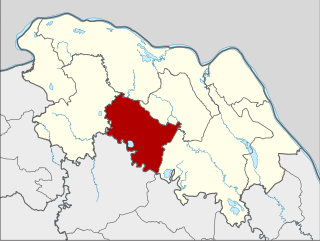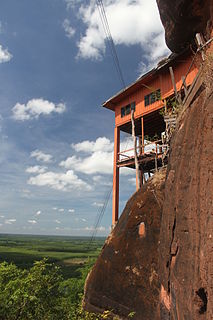Related Research Articles

Bung Khla is a district (amphoe) of Bueng Kan Province, northeastern Thailand.

Mueang Bueng Kan is a capital district of Bueng Kan Province, northeastern Thailand. It is 759 km north-northeast of Bangkok.

Pak Khat is a district (amphoe) in the eastern part of Bueng Kan Province, northeastern Thailand.

Si Wilai is a district (amphoe) in the eastern part of Bueng Kan Province, northeastern Thailand.

Seka is a district (amphoe) in the eastern part of Bueng Kan Province, northeastern Thailand.

So Phisai is a district (amphoe) of Bueng Kan Province, northeastern Thailand.

Phon Charoen is a district (amphoe) of Bueng Kan Province, northeastern Thailand.

Bueng Kan, also spelled Bung Kan, is the 76th province (changwat) of Thailand, established by the Act Establishing Changwat Bueng Kan, BE 2554 (2011) on 23 March 2011. The province, consisting of the districts (amphoe) partitioned off Nong Khai province, lies in upper northeastern Thailand also called Isan. It is named after its central district, Mueang Bueng Kan.

Ho Kham is a sub-district (tambon) in Mueang Bueng Kan District, in Bueng Kan Province, northeastern Thailand. As of 2012, it had a population of 7,116 people and has jurisdiction over 14 villages. It lies on Highway 212 and the Mekong River and border with Laos, west of Khai Si and Bueng Kan.

Khai Si is a sub-district (tambon) in Mueang Bueng Kan District, in Bueng Kan Province, northeastern Thailand. As of 2012, it had a population of 5,294 people. It lies on Highway 212 and the Mekong River and border with Laos, west of Bueng Kan and east of Ho Kham.

Si Wilai is subdistrict (tambon) in Si Wilai District, in Bueng Kan Province, northeastern Thailand. It is the seat of Si Wilai District. As of 2010, it had a population of 10,846 people and jurisdiction over 12 villages. It lies on Thailand Route 222, south of Non Sombun and Bueng Kan. A bus service connects it to Bueng Kan.

Bueng Khong Long is a sub-district (tambon) in Bueng Khong Long District in Bueng Kan Province, northeastern Thailand. As of 2010, it had a population of 10,245 people, with jurisdiction over 17 villages.
Tha Dok Kham is a sub-district (tambon) in Bueng Khong Long District, in Bueng Kan Province, northeastern Thailand. As of 2010, it had a population of 6,879 people and jurisdiction over 11 villages.
Chaiyaphon is a sub-district (tambon) in Mueang Bueng Kan District, in Bueng Kan Province, northeastern Thailand. As of 2010, it had a population of 8,227 people, with jurisdiction over 13 villages.
Kham Na Di is a sub-district (tambon) in Mueang Bueng Kan District, in Bueng Kan Province, northeastern Thailand. As of 2010, it had a population of 5,075 people, with jurisdiction over eight villages.
Khok Kong is a sub-district (tambon) in Mueang Bueng Kan District, in Bueng Kan Province, northeastern Thailand. As of 2010, it had a population of 6,901 people, with jurisdiction over nine villages.
Na Sawan is a sub-district (tambon) in Mueang Bueng Kan District, in Bueng Kan Province, northeastern Thailand. As of 2010, it had a population of 7,535 people, with jurisdiction over nine villages.
Non Sawang is a sub-district (tambon) in Mueang Bueng Kan District, in Bueng Kan Province, northeastern Thailand. As of 2010, it had a population of 6,739 people, with jurisdiction over 11 villages.
Pong Pueai is a sub-district (tambon) in Mueang Bueng Kan District, in Bueng Kan Province, northeastern Thailand. As of 2010, it had a population of 5,085 people, with jurisdiction over seven villages.
Wisit is a sub-district (tambon) in Mueang Bueng Kan District, in Bueng Kan Province, northeastern Thailand. As of 2010, it had a population of 9,557 people, with jurisdiction over 13 villages.
References
- ↑ "Population statistics 2010". Department of Provincial Administration. Archived from the original on 2011-09-10.